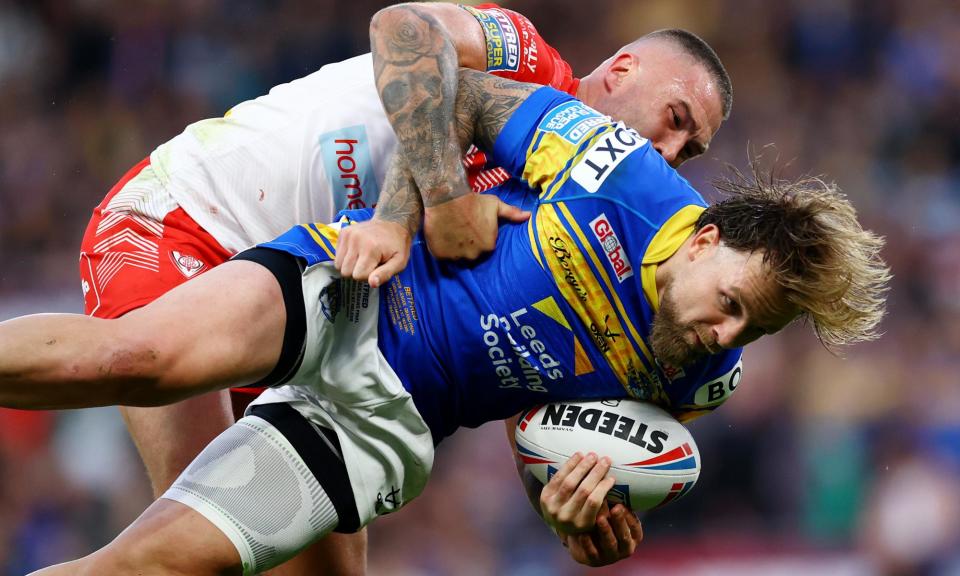Rugby league to lower professional tackle height over concussion risk

Professional rugby league in Britain will lower the legal tackle height to below the armpit from 2025 as part of a sweeping number of recommendations approved by the Rugby Football League designed to make the sport safer for its players and lower the risk of concussion.
In total, 44 recommendations made by the sport’s Brain Health and Clinical Advisory Group have been signed off by the RFL, ranging from the trialling of “concussion spotters” at games from next season to the introduction of match limits for professional players, capping the amount of in-game minutes they can play in any 12-month period.
Related: ‘Let’s look after each other’: Sinfield’s ultra effort for MND spreads the love
The most significant law change is the alteration to the legal tackle height. Currently, any tackle below the neck is deemed legal, with contact to the head resulting in a penalty. But after a high-profile trial this year in which the legal height was lowered to below the armpit in academy fixtures, it has now been recommended and approved that that ruling will become permanent. It will initially be rolled out at community and amateur level from next season before it is also integrated into the professional game at the beginning of the 2025 season.
In the trial, across 24 academy fixtures in the summer, tackles around the head and neck regions were significantly reduced. The opening night yielded an extraordinary 57 penalties but, while that figure continued to be high throughout the trial, the number of tackles that included contact with the head went down. That has played a major role in the recommendations from the committee being carried forward, meaning rugby league at professional level will look and feel remarkably different from 2025.
The RFL has met players and coaches from all levels throughout 2023 to update them on the plans, and the governing body’s chief executive, Tony Sutton, insists it has the support of key stakeholders and promises the changes have been made to protect the long-term welfare of the sport’s players. “The process will be dynamic and as we learn different things as we go through the process, we’ll make appropriate changes, but they won’t be opinion-based,” he said.
The RFL chair, Simon Johnson, added: “We will continue to assess the data so that we can continue to make the game as safe as we possibly can for everybody that wants to play it and to ensure that the cultural change that we require for the game can be introduced.”
From the end of next season, all professional players will also be required to take a mandatory four-week off-season, followed by another two weeks of non-contact training, meaning there will be six weeks every year when players are guaranteed to avoid training in full-contact.
Furthermore, the RFL will introduce match limits for players to restrict their possible exposure to concussion. Any forward over the age of 22 can play only 2,000 minutes in a 12-month period, while any back can play only 2,400 minutes: the equivalent of 25 and 30 full games, respectively. There will be exemptions and dispensations weighted in, though; for example, if a player goes over that limit in a season, they will automatically be required to play less the following campaign.
Stricter punishments for head contact will be introduced, meaning the likelihood of more cards in the early stages of next season. “Concussion spotters”, trained individuals who sit in the stands and inform a bench if a player is displaying possible concussion symptoms, will be trialled at professional games in 2024 in an attempt to protect players. The RFL’s chief medical officer, Chris Brookes, said: “Our clubs and the game have got to show leadership. It’s really important as we move forward that we’re explicit about why we’re doing this and the benefit to the players and the game.”
The news of the law changes comes at a time when the RFL is facing a potential legal challenge from more than 100 former players, who contend the sport was negligent in taking reasonable action to prevent them from serious brain injuries. However, the RFL’s director of operations and legal, Robert Hicks, insisted that the prospect of that legal battle had nothing to do with the changes being made.
He said: “I just don’t think there’s any point trying to speculate what either the legal or medical basis of that claim is at this stage. But to be very clear here, all these changes are based on knowledge that we now have and not in response to anything that may be happening in the legal claim. We’re being a responsible governing body, reacting and adapting the sport to ensure its long-term health.”

